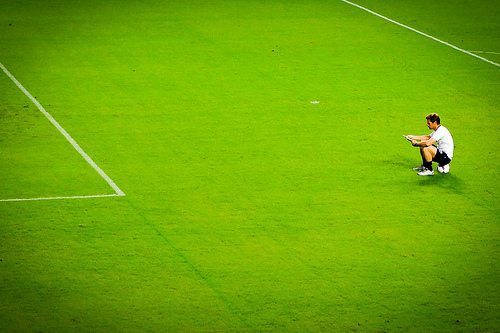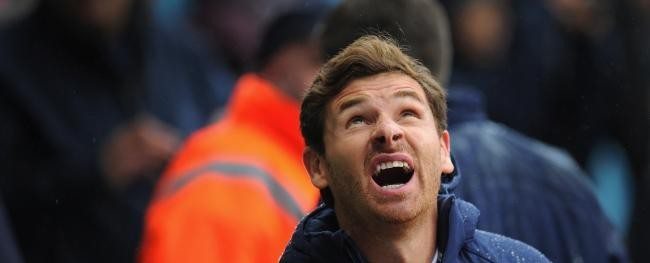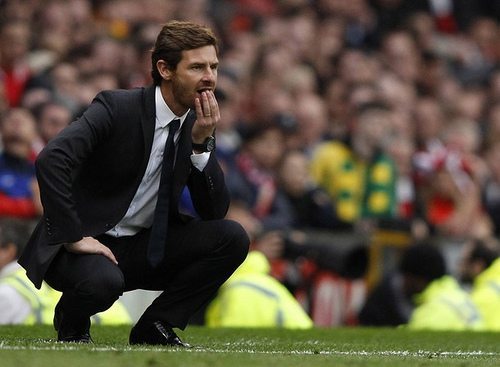Time and patience has run out for AVB
We need to talk about André. In fairness, it didn’t really require a genius to predict that, after a 5-0 Christmas stuffing by Liverpool at White Hart Lane, chairman Daniel Levy was going to call time on AVB’s Tottenham career. His Spurs side never really rallied from a 3-0 home loss against West Ham back in October, and ever since that surprisingly comprehensive defeat, an air of desperation has followed the Portuguese manager.
On Sunday, that desperation was replaced with resignation. Tottenham were woeful; diabolical in defence, out-thought and out-muscled in midfield, and in the final third they were about as penetrative as The 40 Year Old Virgin.
Ah, AVB. Where did it all go wrong? He arrived at White Hart Lane with high expectations, a squad more than capable of challenging for a top four spot, and the most finely sculptured facial hair outside of Soho.
Despite a slightly rocky start, his Spurs side finished in a respectable fifth position with a record 72-point haul in the table last year, beaten to that all-important Champions League spot by one solitary point.
But in truth, the root of his demise can probably be aptly surmised in two words: Gareth Bale.
To Levy’s credit, that astronomical £85m transfer fee was immediately re-invested in seven new players, Eriksen, Lamela and Soldado amongst them. But this sense of immediacy perhaps inadvertently hindered Tottenham. The new players were expected to gel with instant results but have looked at sixes and sevens with each other, struggling to find any sense of attacking cohesion. Garth Crooks commented at the time that Tottenham had sold Elvis, but bought The Beatles. It appears now, however, that he confused the latter with The Jonas Brothers. And a tribute act at that.

Lonely: AVB reportedly isolated himself at Spurs, to the extend that his assistant, Stefan Freund, would no longer sit next to him in the dugout.
Spurs have suffered from some humbling defeats this season. The 6-0 drubbing at the hands of Manchester City was embarrassing, but given the home form of the Citizens this year, it may well have been seen as recoverable by Villas-Boas. The Liverpool score less so.
Far more damaging than the ‘expressive‘ scorelines have been the lacklustre performances. Tottenham, usually a side associated with attacking abandon and midfield élan, have been distressingly expressionless; Liverpool scored more goals from open play at White Hart Lane than Tottenham themselves have managed this season.
Of course, a proportion of the blame for this dearth of goals must be attributed to the players themselves. Roberto Soldado, a man given the formidable nickname of ‘The Soldier’ by Spanish fans when playing well at Valencia, has looked more or less as dangerous as Alan Carr wearing a tutu this season for Spurs. Jermain Defoe, meanwhile, hasn’t made good of the admittedly few chances he’s had handed to him in recent months, snatching at shots and repeatedly wallowing offside.
In fairness to the Tottenham attack, though, the defence didn’t fare much better against the rather formidable Liverpool. Skipper Michael Dawson spent the whole game cumbersomely chasing that tenacious cartoon character of a player, Luis Suarez, a strange, brilliant combination of the Roadrunner from Looney Tunes and Mutley from Wacky Races; in a contest about as equal as a 100 metre sprint between Usain Bolt and Brian Blessed.
Liverpool scored more goals at White Hart Lane than Tottenham themselves have managed this season
These underwhelming individual performances have been compounded by the teenage-esque existential crisis that pervades at the Lane: Tottenham are currently a mess of a football club with no clear identity.
The midfield is overly saturated with momentarily underwhelming talent, and in this strangely perverse lackadaisical battle for places no clear XI has been allowed to develop, undermining any attempts at fostering understanding or rhythm, which are both naturally imperative in generating form and challenging for honours come the end of the season.
Strikingly formative, tender indications of cohesion – Paulinho’s growing attacking relationship with Soldado, or signs of the enthusiastic and endearing Holtby dictating tempo in an offensive midfield role – have been prevented from developing further because of frequent tactical reshuffling. Come on AVB, have you honestly never had a game of Ultimate Team on FIFA? In recent weeks Spurs have desperately required stability, yet Villas-Boas’ squad selection is about as consistent as an Emmanuel Adebayor performance.
These underwhelming individual performances have been compounded by the teenage-esque existential crisis that pervades at the Lane.
It can be contended that AVB himself didn’t actually want many of the new signings at the club; certainly an answer he gave in a recent press conference seemed to indicate as much. It has long been rumoured that Levy and technical director, Franco Baldini, had more of a say in the summer arrivals than the manager. Nevertheless, as the Sky Sports camera kept picking out Levy in the crowd on Sunday, more than a little resembling an irate peanut with a smart club suit and reading glasses, it was hard to see what other options he had at his disposal.
With the full-time crowd, or what was left of it, loudly booing the players off of the pitch at full time, it was clear he had seen enough.
Despite frequently championing the Tottenham ‘project’ cultivated under AVB, and despite successfully warding off the interests of PSG to keep his manager at the club in the summer, Levy was forced to swallow his pride and take decisive action.
The ability to swallow one’s pride is a lesson AVB would have done well to have learnt during his time at the club. One of his major faults during his Tottenham tenure was his perceived inflexibility. He stuck rigidly to his favoured 4-2-3-1 formation with its suicidal high line, for example, despite a severe lack of goals and its seeming lack of suitability for the squad at hand. Casting Soldado and Defoe as lone strikers, at 176 and 170cm respectively, was doomed to failure. A preference for inverted wingers caused consternation also, with Lamela and Townsend both failing to deliver on the promise they have shown previously shown, at both club and international level.
A lack of man-management ability, a weakness well debated at Chelsea but seemingly not addressed sufficiently, has also caused its fair share of trouble at the Tottenham training ground, with respected and more than adequate players such as Benoit Assou-Ekotto and Emmanuel Adebayor frozen out, despite a lack of strength in depth in the left-back and centre-forward departments especially.
These reasons then, combined with the perpetually high expectations at White Hart Lane, ultimately cost AVB his job. The next decision facing Levy is who to replace him with. Former England manager Fabio Capello is in the mix, as is current Southampton manager Mauricio Pochettino. Both potential appointments have their downsides, however: the former has a reputation for playing unattractive football, not too dissimilar to the kind that lost the previous Tottenham manager his job, whilst the latter has still to master the English language, and lacks experience.
Levy could look closer to home, of course, and former players Tim Sherwood and Glenn Hoddle have both been suggested to be in the frame to take the job on until the end of the season. However it remains to be seen whether Hoddle is just Levy’s panic selection in case the current defensive injury crisis doesn’t resolve itself, although it’s unlikely the ex-England manager’s oft-mocked appreciation of faith healing will be appreciated by the perpetually injured likes of Younes Kaboul and Jan Vertonghen.
Whoever succeeds AVB will be expected to deliver results instantly, and to drag the club into the top four by the end of the season. As for Villas-Boas, he must surely now rebuild his reputation abroad before again managing in this country. It will greatly concern him how issues that contributed to his downfall at Chelsea, poor man management, tactical inflexibility, and a dire relationship with the press, once again troubled him at his new club.
Nevertheless, there are positives for Tottenham fans to take from his reign, and his departure bears no great animosity. In the forthcoming weeks White Hart Lane will hope to banish the sight of defensive lines about as risky as a Frankie Boyle joke at a WI meeting, along with inverted wingers and endless sideways passing. But the crowd will appreciate the technical appreciation of the game that AVB brought to the club, and that solid first season.
And God, let us not forget his good looks, an essential tonic after the dark, bloated days of Harry Redknapp. If nothing else, Villas-Boas brought dynamism and class to the dugout, and for this he will be missed.
Monday 16th December was the day Andre Villas-Boas lost his job, and also the day 35,000 man-crushes died.


Comments